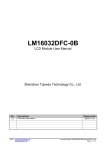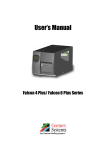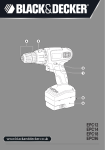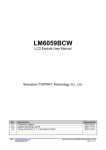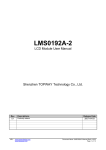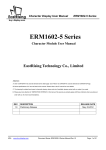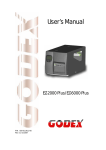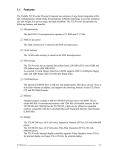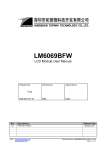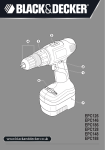Download Digole 128x64Dots Serial/Parallel LCD
Transcript
Digole 128x64Dots Serial/Parallel LCD ST7920 Chinese Fonts built in LCD controller/driver Main Features l l l l l l l l l l l Operation Voltage Range: Ø 4.5V to 5.5V Support 8-bit, 4-bit and serial bus MPU interface 64 x 16-bit display RAM (DDRAM) Ø Supports 16 words x 4 lines (Max) Ø LCD display range 16 words x 2 lines 64 x 256-bit Graphic Display RAM (GDRAM) 2M-bits Character Generation ROM (CGROM): Support 8192 Chinese words (16x16 dot matrix) 16K-bit half-width Character Generation ROM (HCGROM): Supports 126 characters (16x8 dot matrix) 32-common x 64-segment (2 lines of character) LCD drivers Automatic power on reset (POR) External reset pin (XRESET) With the extension segment drivers, the display area can up to 16x2 lines Built-in RC oscillator: Frequency is adjusted by an external resistor Function Description l l l l Low power consumption design Ø Normal mode (450uA Typ VDD=5V) Ø Standby mode (30uA Max VDD=5V) VLCD (V0 to VSS): max 7V Graphic and character mixed display mode Multiple instructions: Ø Display Clear Ø Return Home Ø Display ON/OFF Ø Cursor ON/OFF Ø Display Character Blink Ø Cursor Shift Ø Display Shift Ø Vertical Line Scroll Ø Reverse Display (by line) Ø Standby Mode Built-in voltage booster (2 times) VOUT: max 7V 1/33 Duty (with ICON) Digole l l ST7920 LCD controller/driver IC can display alphabets, numbers, Chinese fonts and self-defined characters. It supports 3 kinds of bus interface, namely 8-bit, 4-bit and serial. All functions, including display RAM, Character Generation ROM, LCD display drivers and control circuits are all in a one-chip solution. With a minimum system configuration, a Chinese character display system can be easily achieved. ST7920 includes character ROM with 8192 16x16 dots Chinese fonts and 126 16x8 dots half-width alphanumerical fonts. Besides, it supports 64x256 dots graphic display area for graphic display (GDRAM). Mix-mode display with both character and graphic data is possible. ST7920 has built-in CGRAM and provide 4 sets software programmable 16x16 fonts. ST7920 has wide operating voltage range (2.7V to 5.5V). It also has low power consumption. So ST7920 is suitable for battery-powered portable device. ST7920 LCD driver consists of 32-common and 64-segment. Company with the extension segment driver (ST7921) ST7920 can support up to 32-common x 256-segment display. Part Number Font Code ST7920-0A ST7920-0B ST7920-0C ST7920-0F BIG-5 Code Set (Traditional Chinese) GB Code Set (Simplified Chinese) Chinese (Traditional/Simplified) & Japanese Chinese (Traditional/Simplified), Japanese & Korean Digole 12864ZW Module System Block Diagram RESI Reset Circuit RESO CLK CL1 CL2 M Timing Generator PSB DOUT Instruction Register (IR) RS MPU Interface RW E Instruction Decoder Input/ Output Buffer 33/49-bit shift register COM1 to Common COM32 Signal Driver SEG1 to SEG64 64-bit shift register Address Counter DB4 to DB7 DB0 to DB3 Display Data RAM (DDRAM) 64 x 16 bits 64-bit latch circuit Data Register (DR) Digole Segment Signal Driver LCD Drive Voltage Selector Busy Flag Graphic RAM (GDRAM) 1024 x 16 bits Vss Half size Character ROM (HCGROM) 1024x16 bits Character Generator RAM (CGRAM) 1024 bits Character Generator ROM (CGROM) 2M bits Cursor Blink Scroll Controller Parallel/Serial converter and Attribute Circuit VDD XOFF XRESET V0 V1 V2 V3 V4 Digole 12864ZW Module Pin Description Name No. RST I/O 17 I Connects to ― PSB 15 I ― RS(CS*) 4 I MPU RW(SID*) 5 I MPU E(SCLK*) 6 I MPU D4 to D7 11~14 I/O MPU D0 to D3 VDD Vss 7~10 2 1 I/O I I MPU Power Power VOUT 18 Function System reset input (low active). Interface selection: 0: serial mode; 1: 8/4-bit parallel bus mode. Parallel Mode: Register select. 0: Select instruction register (write) or busy flag, address counter (read); 1: Select data register (write/read). Serial mode: Chip select. 1: chip enabled; 0: chip disabled. When chip is disabled, SID and SCLK should be set as “H” or “L”. Transcient of SID and SCLK is not allowed. Parallel Mode: Read/Write control. 0: Write; 1: Read. Serial Mode: Sserial data input. Parallel Mode: 1: Enable trigger. Serial Mode: Serial clock. Higher nibble data bus of 8-bit interface and data bus for 4-bit interface Lower nibble data bus of 8-bit interface. VDD : 4.5V to 5.5V. VSS: 0V. LCD voltage doubler output. VOUT ≦ 7V. Digole O Resistors Digole 12864ZW Module Function Description System interface ST7920 supports 3 kinds of bus interface to communicate with MPU: 8-bit parallel, 4-bit parallel and clock synchronized serial interface. Parallel interface is selected by PSB=”1” and serial interface is by PSB=”0”. 8-bit / 4-bit interface is selected by function set instruction DL bit. Two 8-bit registers (Data Register DR and Instruction Register IR) are used in ST7920 to access DRAM or Register. Data Register (DR) can access DDRAM, CGRAM and GDRAM through the address pointer implemented by Address Counter (AC). Instruction Register (IR) stores the instruction sent by MPU to ST7920. 4 kinds of parallel interface access mode can be selected through RS and RW: RS RW Description L L MPU write instruction to instruction register (IR) L H MPU read busy flag (BF) and address counter (AC) H L MPU write data to data register (DR) H H MPU read data from data register (DR) * The serial interface access modes do not have Read operation. Busy Flag (BF) Digole ST7920 needs a process time for any received instruction. Before finishing the received instruction, any further instruction is not accepted. The process time of each instruction is not equal and the internal process is finished or not can be determined by the BF. Internal operation is in progress while BF=”1”, that means ST7920 is in busy state. No further instructions will be accepted until BF=”0”. MPU must check BF to determine whether the internal operation is finished or not before issuing instruction. Address Counter (AC) Address Counter (AC) is used as the address pointer of DDRAM, CGRAM and GDRAM. (AC) can be set by instruction. After that, accesses (Read/Write operations) to the memories, such as DDRAM, CGRAM or GDRAM, (AC) will be increased or decreased by 1 (according to the setting in “Entry Mode Set” Register). When RS=”0”, RW=”1” and E=”1” the value of (AC) will be output to DB6~DB0. Character Generation ROM (CGROM) and Half-width Character Generation ROM (HCGROM) ST7920 is built in a Character Generation ROM (CGROM) to provide 8192 16x16 character fonts and a Half-width Character Generation ROM to provide 126 8x16 alphanumeric characters. It is easy to support multi-language applications such as Chinese and English. Two consecutive bytes are used to specify one 16x16 character or two 8x16 half-width characters. Character codes are written into DDRAM and the corresponding fonts are mapped from CGROM or HCGROM to the display drivers. Character Generation RAM (CGRAM) ST7920 is built in a Character Generation RAM (CGRAM) to support user-defined fonts. Four sets of 16x16 bit-maped RAM spaces are available. These user-defined fonts are displayed the same ways as CGROM fonts by writing the related character code into the DDRAM. Digole 12864ZW Module Display Data RAM (DDRAM) There are 64x2 bytes RAM spaces for the Display Data RAM. It can store display data such as 16 characters (16x16) by 4 lines or 32 characters (8x16) by 4 lines. However, only 2 character-lines (maximum 32 common outputs) can be displayed at one time. Character codes stored in DDRAM will refer to the fonts specified by CGROM, HCGROM and CGRAM. ST7920 can display half-width HCGROM fonts, user-defined CGRAM fonts and full 16x16 CGROM fonts. The character codes in 0000H~0006H will use user-defined fonts in CGRAM. The character codes in 02H~7FH will use half-width alpha numeric fonts. The character code larger than A1H will be treated as 16x16 fonts and will be combined with the next byte automatically. The 16x16 BIG5 fonts are stored in A140H~D75FH while the 16x16 GB fonts are stored in A1A0H~F7FFH. In short: 1. To display HCGROM fonts: Write 2 bytes of data into DDRAM to display two 8x16 fonts. Each byte represents 1 character. The data is among 02H~7FH. 2. To display CGRAM fonts: Write 2 bytes of data into DDRAM to display one 16x16 font. Only 0000H, 0002H, 0004H and 0006H are acceptable. 3. To display CGROM fonts: Write 2 bytes of data into DDRAM to display one 16x16 font. A140H~D75FH are BIG5 code, A1A0H~F7FFH are GB code. The higher byte (D15~D8) is written first and the lower byte (D7~D0) is the next. Digole Please refer to Table 5 for the relationship between DDRAM and the address/data of CGRAM. CGRAM fonts and CGROM fonts can only be displayed in the start position of each address. (Refer toTable 4) 81 82 83 84 85 86 87 88 89 8A 8B 8C 8D 8E 8F 80 H L H L H L H L H L H L H L H L H L H L H L H L H L H L H L H L S i t r o n i x S T 7 9 2 0 矽 創 電 子 中 文 編 碼 正 確 ( . . ) 矽 創 電 子 中 文 編 碼 . . . Table 4 Incorrect start position Digole 12864ZW Module Graphic RAM (GDRAM) Graphic Display RAM has 64x256 bits bit-mapped memory space. GDRAM address is set by writing 2 consecutive bytes of vertical address and horizontal address. Two-byte data (16 bits) configures one GDRAM horizontal address. The Address Counter (AC) will be increased by one automatically after receiving the 16-bit data for the next operation. After the horizontal address reaching 0FH, the horizontal address will be set to 00H and the vertical address will not change. The procedure is summarized below: 1. Set vertical address (Y) for GDRAM 2. Set horizontal address (X) for GDRAM 3. Write D15~D8 to GDRAM (first byte) 4. Write D7~D0 to GDRAM (second byte) Please refer to Table 7 for Graphic Display RAM mapping. LCD driver ST7920 embedded LCD driver has 33 commons and 64 segments to drive the LCD panel. Segment data from CGRAM, CGROM and HCGROM are shifted into the 64 bits segment latche to display. Extended segment driver (ST7921) can be used to extend the segment outputs upto 256 segments. Digole Digole 12864ZW Module DDRAM data CGRAM CGRAM data CGRAM data (char. code) Addr. (higher byte) (lower byte) B B B B B B B BB B DDDDDDDDDDDDDDDD B15~ B4 3 2 1 0 5 4 3 2 1 0 1 1 1 1 1 1 9 8 7 6 5 4 3 2 1 0 543210 00000000010001100000 00011111111001000000 00100001000001000100 00110001000001111110 01000010010010000100 01010011110010000100 01100110010101001000 01111010011001001000 0 X 00 X 00 10000010010001010000 10010010010000010000 10100010010000100000 10110011110000100000 11000010010001000000 11010000000010000000 11100000000100000000 11110000000000000000 00000000110000000110 00010001101000000100 00100010000100110100 00110101110110100100 01001000000010100100 01010111111100100100 01100100000100100100 01110111111100100100 0 X 01 X 01 10000100000100100100 10010111111100100100 10100100000000100100 10110111111110 00100 11001010000010100100 11011011111110011100 11101010000010001000 11110000000000000000 Digole Table 5: DDRAM data (character code) vs. CGRAM data/address map Note: 1. DDRAM data (character code) bit1 and bit2 are identical with CGRAM address bit4 and bit5. 2. CGRAM address bit0 to bit3 specify total 16 rows. Row-16 is for cursor display. The data in Row-16 will be logically OR to the cursor. 3. CGRAM data for each address is 16 bits. 4. To select the CGRAM font, the bit4 through bit15 of DDRAM data must be “0” while bit0 and bit3 are “don’t care”. Digole 12864ZW Module Digole Table 6 16x8 half-width characters Digole 12864ZW Module GDRAM Horizontal address( X) 0 GDRAM Vertical address ︵ Y ︶ 0 1 2 3 4 5 6 7 8 9 10 11 12 13 14 15 16 17 18 19 20 21 22 23 24 25 26 27 28 29 30 31 32 33 34 35 36 37 38 39 40 41 42 43 44 45 46 47 48 49 50 51 52 53 54 55 56 57 58 59 60 61 62 63 15 ........... Digole ........... b15 b14 b13 Table 7 ........... 1 ........... b0 GDRAM display coordinates and corresponding address Digole 12864ZW Module Instructions ST7920 offers basic instruction set and extended instruction set: Instruction Set 1: (RE=0: Basic Instruction) Inst. Display Clear Return Home Entry Mode Set Display Control Code RS RW DB7 DB6 DB5 DB4 DB3 DB2 DB1 DB0 0 0 0 0 0 0 0 0 0 1 0 0 0 0 0 0 0 0 1 X 0 0 0 0 0 0 0 1 I/D S Fill DDRAM with "20H" and set DDRAM address counter (AC) to "00H". Set DDRAM address counter (AC) to "00H", and put cursor to origin ;the content of DDRAM are not changed Set cursor position and display shift when doing write or read operation Exec time (540KHZ) 1.6 ms 72 us 72 us D=1: Display ON 0 0 0 0 0 0 1 D C B C=1: Cursor ON 72 us B=1: Character Blink ON Cursor Display Description 0 0 0 0 0 1 S/C R/L X X Control Cursor position and display shift control; the content of DDRAM are not changed 72 us DL=1 8-bit interface Function Set 0 0 0 0 1 DL X 0 RE X X DL=0 4-bit interface RE=1: extended instruction Digole 72 us RE=0: basic instruction Set CGRAM Set CGRAM address to address counter (AC) 0 0 0 1 AC5 AC4 AC3 AC2 AC1 AC0 Make sure that in extended instruction SR=0 (scroll or Set DDRAM 1 0 0 0 0 1 BF AC6 AC5 AC4 AC3 AC2 AC1 AC0 Write RAM 1 0 D7 D6 D5 D4 D3 D2 D1 D0 Read RAM 1 1 D7 D6 D5 D4 D3 D2 D1 D0 Address. AC6 AC5 AC4 AC3 AC2 AC1 AC0 Read Busy Flag 72 us RAM address select) Address. (BF) & AC. Set DDRAM address to address counter (AC) AC6 is fixed to 0 Read busy flag (BF) for completion of internal operation, also Read out the value of address counter (AC) Write data to internal RAM (DDRAM/CGRAM/GDRAM) Read data from internal RAM (DDRAM/CGRAM/GDRAM) 72 us 0 us 72 us 72 us Digole 12864ZW Module Instruction set 2: (RE=1: extended instruction) Inst. Standby Code Description RS RW DB7 DB6 DB5 DB4 DB3 DB2 DB1 DB0 0 0 0 0 0 0 0 0 0 1 0 0 0 0 0 0 0 0 1 SR Enter standby mode, any other instruction can terminate. COM1…32 are halted. Exec time (540KHZ) 72 us Scroll or RAM Address. SR=1: enable vertical scroll position SR=0: enable CGRAM address (basic instruction) 72 us Select Reverse (by line) Select 1 out of 4 line (in DDRAM) and decide whether to 0 0 0 0 0 0 0 1 R1 R0 reverse the display by toggling this instruction 72 us R1,R0 initial value is 0,0 DL=1 :8-bit interface DL=0 :4-bit interface Extended Function 0 0 0 0 1 DL Set X 1 RE G 0 RE=1: extended instruction set RE=0: basic instruction set 72 us G=1 :graphic display ON G=0 :graphic display OFF Set Scroll Address 0 0 0 1 RAM Address 72 us Set GDRAM address to address counter (AC) Set Graphic Display Digole AC5 AC4 AC3 AC2 AC1 AC0 SR=1: AC5~AC0 the address of vertical scroll 0 0 1 0 0 0 0 AC3 AC2 AC1 AC0 AC5 AC4 AC3 AC2 AC1 AC0 Set the vertical address first and followed the horizontal address by consecutive writings 72 us Vertical address range: AC5…AC0 Horizontal address range: AC3…AC0 Note: 1. Make sure that ST7920 is not in busy state by reading the busy flag before sending instruction or data. If using delay loop instead, please make sure the delay time is enough. Please refer to the instruction execution time. 2. “RE” is the selection bit of basic and extended instruction set. After setting the RE bit, the value will be kept. So that the software doesn’t have to set RE every time when using the same instruction set. Digole 12864ZW Module Initial Setting (Register flag) (RE=0: basic instruction) Inst. Entry Mode Code 0 0 0 0 0 0 0 1 I/D S 1 0 D C B 0 0 0 X X Set Display 0 0 0 0 0 0 1 0 0 0 0 0 1 S/C R/L No cursor or display shift operation DISPLAY X SHIFT FUNCTION Cursor move to right ,DDRAM address counter (AC) plus 1 Display, cursor and blink are ALL OFF Control CURSOR Description RS RW DB7 DB6 DB5 DB4 DB3 DB2 DB1 DB0 0 0 0 0 1 SET DL X 1 X 0 RE X X 8-bit MPU interface , basic instruction set 0 Initial Setting (Register flag) (RE=1: extended instruction set) Inst. SCROLL OR RAM Digole Code 0 0 0 0 0 0 0 0 1 SR Allow vertical scroll or set CGRAM address ADDR. 0 SELECT 0 0 0 0 0 0 0 1 R1 R0 0 0 G 0 REVERSE EXTENDED FUNCTION SET Description RS RW DB7 DB6 DB5 DB4 DB3 DB2 DB1 DB0 Begin with normal and toggle to reverse 0 0 0 0 1 DL X 1 RE Graphic display OFF 0 Digole 12864ZW Module Description of basic instruction set l Display Clear RS Code l 0 0 0 0 0 0 0 0 0 1 This instruction will change the following items: 1. Fill DDRAM with "20H"(space code). 2. Set DDRAM address counter (AC) to"00H". 3. Set Entry Mode I/D bit to be "1". Cursor moves right and AC adds 1 after write or read operation. Return Home RS Code l RW DB7 DB6 DB5 DB4 DB3 DB2 DB1 DB0 0 RW DB7 DB6 DB5 DB4 DB3 DB2 DB1 DB0 0 0 0 0 0 0 0 1 X Set address counter (AC) to "00H". Cursor moves to origin. Then content of DDRAM is not changed. Enry Mode Set RS Code 0 RW DB7 DB6 DB5 DB4 DB3 DB2 DB1 DB0 0 0 0 0 0 0 1 I/D S Set the cursor movement and display shift direction when doing write or read operation. I/D: Address Counter Control: (Increase/Decrease) When I/D = "1", cursor moves right, address counter (AC) is increased by 1. When I/D = "0", cursor moves left, address counter (AC) is decreased by 1. S: Display Shift Control: (Shift Left/Right) S I/D DESCRIPTION H H Entire display shift left by 1 H L Entire display shift right by 1 Digole Digole 12864ZW Module l Display Control RS Code 0 RW DB7 DB6 DB5 DB4 DB3 DB2 DB1 DB0 0 0 0 0 0 1 D C B Controls display, cursor and blink ON/OFF. D: Display ON/OFF control bit When D = "1", display ON When D = "0", display OFF, the content of DDRAM is not changed C: Cursor ON/OFF control bit When C = "1", cursor ON. When C = "0", cursor OFF. B: Character Blink ON/OFF control bit When B = "1", cursor position blink ON. Then display data (character) in cursor position will blink. When B = "0", cursor position blink OFF l Cursor/Display Shift Control RS Code 0 RW DB7 DB6 DB5 DB4 DB3 DB2 DB1 DB0 0 0 0 0 1 S/C R/L X X This instruction configures the cursor moving direction or the display shifting direction. The content of DDRAM is not changed. S/C R/L Description AC Value L L Cursor moves left by 1 position AC=AC-1 L H Cursor moves right by 1 position AC=AC+1 H L Display shift left by 1, cursor also follows to shift. AC=AC H H Display shift right by 1, cursor also follows to shift. AC=AC Digole Digole 12864ZW Module l Function Set RW DB7 DB6 DB5 DB4 DB3 DB2 DB1 DB0 RS Code 0 0 0 0 1 DL X RE X X DL: 4/8-bit interface control bit When DL = "1", 8-bit MPU bus interface When DL = "0", 4-bit MPU bus interface RE: extended instruction set control bit When RE = "1", extended instruction set When RE = "0", basic instruction set In same instruction cannot alter DL and RE at once. Make sure that change DL first then RE. l Set CGRAM Address RS RW 0 0 Code DB7 DB6 0 1 DB5 DB4 DB3 DB2 DB1 DB0 AC5 AC4 AC3 AC2 AC1 AC0 Set CGRAM address into address counter (AC) AC range is 00H…3FH Make sure that in extended instruction SR=0 (scroll address or RAM address select) l Set DDRAM Address RS 0 Code Digole RW DB7 0 1 DB6 DB5 DB4 DB3 DB2 DB1 DB0 AC6 AC5 AC4 AC3 AC2 AC1 AC0 Set DDRAM address into address counter (AC). First line AC range is 80H…8FH Second line AC range is 90H…9FH Third line AC range is A0H…AFH Fourth line AC range is B0H…BFH Please note that only 2 lines can be display with one ST7920. l Read Busy Flag (BF) and Address Code RS RW DB7 0 1 BF DB6 DB5 DB4 DB3 DB2 DB1 DB0 AC6 AC5 AC4 AC3 AC2 AC1 AC0 Read busy flag (BF) can check whether the internal operation is finished or not. At the same time, the value of address counter (AC) is also read. When BF = “1”, further instruction(s) will not be accepted until BF = “0”. Digole 12864ZW Module l Write Data to RAM RS Code 1 RW DB7 DB6 DB5 DB4 DB3 DB2 DB1 DB0 0 D7 D6 D5 D4 D3 D2 D1 D0 Write data to the internal RAM and increase/decrease the (AC) by 1 Each RAM address (CGRAM, DDRAM and GDRAM…) must write 2 consecutive bytes for 16-bit data. After receiving the second byte, the address counter will increase or decrease by 1 according to the entry mode set control bit. l Read RAM Data RS Code 1 RW DB7 DB6 DB5 DB4 DB3 DB2 DB1 DB0 1 D7 D6 D5 D4 D3 D2 D1 D0 Read data from the internal RAM and increase/decrease the (AC) by 1 After the operation mode changed to Read (CGRAM, DDRAM and GDRAM…), a “Dummy Read” is required. There is no need to add a “Dummy Read” for the following bytes unless a new address set instruction is issued. Digole Digole 12864ZW Module Description of extended instruction set l Standby RS 0 Code RW DB7 DB6 DB5 DB4 DB3 DB2 DB1 DB0 0 0 0 0 0 0 0 0 1 This Instruction will set ST7920 entering the standby mode. Any other instruction follows this instruction will terminate the standby mode. The content of DDRAM remains the same. l Vertical Scroll or RAM Address Select RS 0 Code RW DB7 DB6 DB5 DB4 DB3 DB2 DB1 DB0 0 0 0 0 0 0 0 1 SR When SR = "1", the Vertical Scroll mode is enabled. When SR = "0", “Set CGRAM Address” instruction (basic instruction) is enabled. l Reverse RS 0 Code RW DB7 DB6 DB5 DB4 DB3 DB2 DB1 DB0 0 0 0 0 0 0 1 R1 R0 Digole Select 1 out of 4 lines to reverse the display and to toggle the reverse condition by repeating this instruction. R1, R0 initial vale is 00. The first time issuing this instruction, the display will be reversed while the second time will return the display become normal. R1 L R0 L Description First line normal or reverse L H Second line normal or reverse H L Third line normal or reverse H H Fourth line normal or reverse Please note that only 2 lines out of 4 lines of display data can be displayed with one ST7920. Digole 12864ZW Module l Extended Function Set RS Code 0 RW DB7 DB6 DB5 DB4 DB3 DB2 DB1 DB0 0 0 0 1 DL X RE G X DL: 4/8-bit interface control bit When DL = "1", 8-bit MPU interface. When DL = "0", 4-bit MPU interface. RE: extended instruction set control bit When RE = "1", extended instruction set When RE = "0", basic instruction set G: Graphic display control bit When G = "1", Graphic Display ON When G = "0", Graphic Display OFF In same instruction cannot alter DL, RE and G at once. Make sure that change DL or G first and then RE. l Set Scroll Address RS RW 0 0 DB7 0 DB6 1 DB5 DB4 DB3 DB2 DB1 DB0 AC5 AC4 AC3 AC2 AC1 AC0 Code Digole SR=1: AC5~AC0 is vertical scroll displacement address l Set Graphic RAM Address RS RW 0 0 Code RS RW 0 0 DB7 1 DB7 1 DB6 0 DB6 0 DB5 DB4 DB3 DB2 DB1 DB0 AC5 AC4 AC3 AC2 AC1 AC0 DB5 0 DB4 0 DB3 DB2 DB1 DB0 AC3 AC2 AC1 AC0 Code Set GDRAM address into address counter (AC). This is a 2-byte instruction. The first instruction sets the vertical address while the second one sets the horizontal address (write 2 consecutive bytes to complete the vertical and horizontal address setting). Vertical address range is AC5...AC0 Horizontal address range is AC3…AC0 The address counter (AC) of graphic RAM (GRAM) will be increased automatically after the vertical and horizontal addresses are set. After horizontal address is increased upto 0FH, it will automatically return to 00H. However, the vertical address will not increase as the result of the same action. Digole 12864ZW Module Parallel interface: ST7920 is in parallel mode by pulling up PSB pin. ST7920 can select 8-bit or 4-bit bus interface by setting the DL control bit in “Function Set” instruction. MPU can control RS, RW, E and DB0…DB7 pins to complete the data transmission. In 4-bit transfer mode, every 8-bit data or instruction is separated into 2 parts. The higher 4 bits (bit-7~bit-4) data will be transfered first through data pins (DB7~DB4). The lower 4 bits (bit-3~bit-0) data will be transfered second through data pins (DB7~DB4). The (DB3~DB0) data pins are not used during 4-bit transfer mode. RS RW E DB0-DB7 Instruction write Dummy read RAM read Digole Timing Diagram of 8-bit Parallel Bus Mode Data Transfer RS RW E DB0-DB7 Upper Lower Upper Lower Upper Lower 4-bit 4-bit 4-bit 4-bit 4-bit 4-bit Instruction write Dummy read RAM read Timing Diagram of 4-bit Parallel Bus Mode Data Transfer Digole 12864ZW Module Serial interface: ST7920 is in serial interface mode when pulling down PSB pin. Two pins (SCLK and SID) are used to complete the data transfer. Only write data is available in the serial interface mode. When chip select (CS) is low, ST7920 serial clock counter and serial data will be reset. Serial transfer counter is set to the first bit and data register is cleared. After CS is “L”, any further change on SID or SCLK is not allowed. It is recommended to keep SCLK at “L” and SID at the last status before set CS to “L”. For a minimal system with only one ST7920 and one MPU, only SCLK and SID pins are necessary. CS pin should pull to high. ST7920’s serial clock (SCLK) is asynchronous to the internal clock and is generated by MPU. When multiple instruction/data is transferred, the instruction execution time must be considered. MPU must wait till the previous instruction is finished and then send the next instruction. ST7920 has no internal instruction buffer area. When starting a transmission, a start byte is required. It consists of 5 consecutive “1” (sync character). Serial transfer counter will be reset and synchronized. Followed by 2-bit flag that indicates: read/write (RW) and register/data selected (RS) operation. Last 4 bits are filled by “0”. After receiving the sync character, RW and RS bits, every 8 bits instruction/data will be separated into 2 groups. Higher 4 bits (DB7~DB4) will be placed in the first section followed by 4 “0”s. And lower 4 bits (DB3~DB0) will be placed in the second section followed by 4 “0”s. CS 2 3 4 5 1 1 1 1 1 RW RS 0 D7 D6 D5 D4 0 SCLK SID Digole 1 Synchronizing Bit string 6 7 8 9 10 11 12 13 14 15 16 17 18 19 20 21 22 23 24 Higher data 0 0 0 D3 D2 D1 D0 0 0 Lower data 1st byte Timing Diagram of Serial Mode Data Transfer 2nd byte 0 0 Digole 12864ZW Module 8051 demo program for serial interface ;-------------------------------------------------------------; Write data from A into INSTRUCTION Register ;-------------------------------------------------------------WRINS: SETB CS SETB SID ; SID = 1 CLR SCLK SETB SCLK ; READ DATA FROM SID CLR SCLK SETB SCLK ; READ DATA FROM SID CLR SCLK SETB SCLK ; READ DATA FROM SID CLR SCLK SETB SCLK ; READ DATA FROM SID CLR SCLK SETB SCLK ; READ DATA FROM SID CLR SCLK CLR SID ; SID = 0 SETB SCLK ; READ DATA FROM SID CLR SCLK SETB SCLK ; READ DATA FROM SID CLR SCLK SETB SCLK ; READ DATA FROM SID CLR SCLK MOVBIT SID, A.7 ; SID = A.7 SETB SCLK ; READ DATA FROM SID CLR SCLK MOVBIT SID, A.6 ; SID = A.6 SETB SCLK ; READ DATA FROM SID CLR SCLK MOVBIT SID, A.5 ; SID = A.5 SETB SCLK ; READ DATA FROM SID CLR SCLK MOVBIT SID, A.4 ; SID = A.4 SETB SCLK ; READ DATA FROM SID CLR SCLK CLR SID ; SID = 0 SETB SCLK ; READ DATA FROM SID CLR SCLK SETB SCLK ; READ DATA FROM SID CLR SCLK SETB SCLK ; READ DATA FROM SID CLR SCLK SETB SCLK ; READ DATA FROM SID CLR SCLK MOVBIT SID, A.3 ; SID = A.3 SETB SCLK ; READ DATA FROM SID CLR SCLK MOVBIT SID, A.2 ; SID = A.2 SETB SCLK ; READ DATA FROM SID CLR SCLK MOVBIT SID, A.1 ; SID = A.1 SETB SCLK ; READ DATA FROM SID CLR SCLK MOVBIT SID, A.0 ; SID = A.0 SETB SCLK ; READ DATA FROM SID CLR SCLK CLR SID ; SID = 0 SETB SCLK ; READ DATA FROM SID CLR SCLK SETB SCLK ; READ DATA FROM SID CLR SCLK SETB SCLK ; READ DATA FROM SID CLR SCLK SETB SCLK ; READ DATA FROM SID CLR SCLK CLR CS CALL DLY8 RET ;------------------------------------------------; Write data from A into DATA Register ;------------------------------------------------WRDATA: SETB CS SETB SID ; SID = 1 CLR SCLK SETB SCLK ; READ DATA FROM SID CLR SCLK SETB SCLK ; READ DATA FROM SID CLR SCLK SETB SCLK ; READ DATA FROM SID CLR SCLK SETB SCLK ; READ DATA FROM SID CLR SCLK SETB SCLK ; READ DATA FROM SID CLR SCLK CLR SID ; SID = 0 SETB SCLK ; READ DATA FROM SID CLR SCLK SETB SID ; SID = 1 SETB SCLK ; READ DATA FROM SID CLR SCLK CLR SID ; SID = 0 SETB SCLK ; READ DATA FROM SID CLR SCLK MOVBIT SID, A.7 ; SID = A.7 SETB SCLK ; READ DATA FROM SID CLR SCLK MOVBIT SID, A.6 ; SID = A.6 SETB SCLK ; READ DATA FROM SID CLR SCLK MOVBIT SID, A.5 ; SID = A.5 SETB SCLK ; READ DATA FROM SID CLR SCLK MOVBIT SID, A.4 ; SID = A.4 SETB SCLK ; READ DATA FROM SID CLR SCLK CLR SID ; SID = 0 SETB SCLK ; READ DATA FROM SID CLR SCLK SETB SCLK ; READ DATA FROM SID CLR SCLK SETB SCLK ; READ DATA FROM SID CLR SCLK SETB SCLK ; READ DATA FROM SID CLR SCLK MOVBIT SID, A.3 ; SID = A.3 SETB SCLK ; READ DATA FROM SID CLR SCLK MOVBIT SID, A.2 ; SID = A.2 SETB SCLK ; READ DATA FROM SID CLR SCLK MOVBIT SID, A.1 ; SID = A.1 SETB SCLK ; READ DATA FROM SID CLR SCLK MOVBIT SID, A.0 ; SID = A.0 SETB SCLK ; READ DATA FROM SID CLR SCLK CLR SID ; SID = 0 SETB SCLK ; READ DATA FROM SID CLR SCLK SETB SCLK ; READ DATA FROM SID CLR SCLK SETB SCLK ; READ DATA FROM SID CLR SCLK SETB SCLK ; READ DATA FROM SID CLR SCLK CLR CS CALL DLY8 RET Digole Digole 12864ZW Module Application circuit for testing CGROM and HCGROM: We can use the function of “CHECK SUM” to check the CGROM is right or error. See the following notes: Useing IC Pad (Pin4àCLK, Pin5àTT1, Pin6àTT2) to do the “CHECK SUM” function. The application circuit is at Page49. Timing Diagram for checking CGROM (TT1=0, TT2=1) The ST7920 check sum process: (DDRAM must be cleared by 0x00 before this process) In the first place: Resetting the internal counter (set TT1 and TT2 to Height) In the second place: Setting CGROM mode (set TT1 to Low, TT2 to Height). In the third place: CLK starts to count 655362 times. In the final place: Finishing the counting, read the last four bytes to CHECK SUM (reading only when the CLK is Height). ST7920 check sum circuit: Data is available when CLK is height; if CLK is low then the data is always FFH. The last four bytes are Y0, Y1, Y2, and Y3. Digole The fatest execution time is: tCYC=1us (1MHz at 5V). The table below is a comparing table of CGROM for different versions. Version (Font) CGROM Last four bytes Y0 Y1 Y2 Y3 1 Big5 (0A) 38 88 CC F1 2 GB (0B) 9D 81 79 29 3 0C FD 6F B5 85 Digole 12864ZW Module Timing Diagram for checking HCGROM (TT1=1, TT2=0) The ST7920 check sum process: (DDRAM must be cleared by 0x00 before this process) In the first place: Resetting the internal counter (set TT1 and TT2 to Height) In the second place: Setting CGROM mode (set TT1 to Height, TT2 to Low). In the third place: CLK starts to count 10242 times. In the final place: Finishing the counting, read the last four bytes to CHECK SUM (reading only when the CLK is Height). ST7920 check sum circuit: Data is available when CLK is height; if CLK is low then the data is always FFH. The last four bytes are Y0, Y1, Y2, and Y3. Digole The fatest execution time is: tCYC=2us (0.5MHz at 5V). The table below is a comparing table of HCGROM for different versions. Version (Font) HCGROM last four bytes Y0 Y1 Y2 Y3 1 Big5 (0A) B5 11 B5 11 2 GB (0B) B5 11 B5 11 3 0C B5 11 B5 11 Digole 12864ZW Module Testing Step: 1. Clear whole DDRAM area by writing data 0x00. 2. Composing TT1 and TT2 to make the ‘Reset’ action, and clear the internal counter. 3. Selecting the test mode by setting TT1 and TT2 (CGROM or HCGROM). 4. After setp1 and setp2, entering some impulse signals through Pin4 (CLK). 5. Reading the CHECK SUM data through D0 to D7. 6. Comparing CHECK SUM with the Code Table (upper table) to check if the data is correct or not. TT1 TT2 No. of counts Status 1 1 -- RESET 0 1 655362 CGROM 1 0 10242 HGROM Test process flow: Digole Digole 12864ZW Module 8051 CGROM、HCGROM illustrative test program CLK TT1 TT2 TT3 TT4 TT5 STACK FUNC RESET: CGROM: CN4: CN3: CN2: CN5: CN6: ;*******************************; ;* CHECK_ROM *; ;*******************************; ;*******************************; ;* Definition of outside Pin *; ;*******************************; REG P3.5 ; REG P3.0 ; REG P3.1 ; REG P3.2 ;CHECK CGROM FLAG REG P3.3 ;CHECK HCGROM FLAG REG P3.4 ;ERROR FLAG ;*******************************; ;* Definition of internal RAM *; ;*******************************; EQU 6FH ; EQU 20H ; ;*******************************; ; Interrupt set *; ;*******************************; ORG 00H ; AJMP RESET ; ;*******************************; ;* PROGRAM START *; ;*******************************; MOV SP,#STACK ; MOV P1,#FFH ; MOV P3,#FFH ; ;*******************************; ;* CHECK_CGROM *; ;*******************************; ;*******************************; ;* Initial DDRAM *; ;*******************************; CALL WR0x00 ;Write 0x00 to whole DDRAM ;*******************************; ;* Initial setting *; ;*******************************; SETB TT1 ; SETB TT2 ;TT1,TT2 SET HIGH (RESET) CALL DELAY_100US ;Wait Reset 100us CLR TT1 ;TT1=LOW TT2=HIGH ( CHECK CGROM) SETB CLK ; CALL DELAY_100US ; ;*******************************; ;* start counter *; ;*******************************; MOV R3,#9 ; MOV R2,#0 ;<---MOV R1,#0 ; | CLR CLK ; | SETB CLK ; | DJNZ R1,CN2 ; | DJNZ R2,CN3 ; | DJNZ R3,CN4 ; | ; | MOV R3,#0 ; | MOV R2,#255 ; | CLR CLK ; | SETB CLK ; | DJNZ R2,CN6 ; | DJNZ R3,CN5 ; | ; | Digole Digole 12864ZW Module CN7: CN8: CN9: MOV R3,#63 ; | MOV R2,#2 ; | MOV R1,#2 ; | CLR CLK ; | SETB CLK ; | DJNZ R1,CN9 ; | DJNZ R2,CN8 ; | DJNZ R3,CN7 ; | CLR CLK ; | SETB CLK ; | CLR CLK ; | SETB CLK ;<---- Counter 655356 ;-------------------------------; CLR CLK ;Counter 655357 SETB CLK ; MOV A,P1 ;A=Y0 CJNE A,#FDH,ERRORC ;COMPARE Y0 DATA CLR CLK ;Counter 655358 SETB CLK ; MOV A,P1 ;A=Y1 CJNE A,#6FH,ERRORC ;COMPARE Y1 DATA CLR CLK ;Counter 655359 SETB CLK ; MOV A,P1 ;A=Y2 CJNE A,#B5H,ERRORC ;COMPARE Y2 DATA CLR SETB MOV CJNE CLR CLR CALL CLK CLK A,P1 A,#85H,ERRORC CLK TT3 HCGROM ;Counter 655360 ; ;A=Y3 ;COMPARE Y3 DATA ; ;IF OK CLR TT3 ; ERRORC: ; CLR TT5 ;IF CGROM CHECK ERROR CLR TT5 ;---------------------------------------; ;*******************************; ;* CHECK_HCGROM *; ;*******************************; ;*******************************; ;* Initial setting *; ;*******************************; HCGROM: SETB TT1 ; SETB TT2 ;TT1,TT2 SET HIGH (RESET) CALL DELAY_100US ;Wait Reset 100us CLR TT2 ;TT2=LOW TT1=HIGH ( CHECK HCGROM) SETB CLK ; CALL DELAY_100US ; ;*******************************; ;* start counter *; ;*******************************; MOV R3,#9 ; N4: MOV R2,#32 ;<---N3: MOV R1,#32 ; | N2: CLR CLK ; | SETB CLK ; | DJNZ R1,N2 ; | DJNZ R2,N3 ; | DJNZ R3,N4 ; | ; | MOV R3,#32 ; | N5: MOV R2,#31 ; | N6: CLR CLK ; | SETB CLK ; | DJNZ R2,N6 ; | DJNZ R3,N5 ; | ; | MOV R2,#30 ; | Digole Digole 12864ZW Module N7: CLR CLK ; | SETB CLK ; | DJNZ R2,N7 ; | ;---------------------------------------;<---- Counter 10236 CLR CLK ;Counter 10237 SETB CLK ; MOV A,P1 ;A=Y0 CJNE A,#B5H,ERROR ;COMPARE Y0 DATA CLR CLK ;Counter 10238 SETB CLK ; MOV A,P1 ;A=Y1 CJNE A,#11H,ERROR ;COMPARE Y1 DATA CLR CLK ;Counter 10239 SETB CLK ; MOV A,P1 ;A=Y2 CJNE A,#B5H,ERROR ;COMPARE Y2 DATA CLR CLK ;Counter 10240 SETB CLK ; MOV A,P1 ;A=Y3 CJNE A,#11H,ERROR ;COMPARE Y3 DATA CLR CLK ; CLR TT4 ;IF HCGROM CHECK OK THEN CLR TT4 AJMP $ ; ERROR: ; CLR TT5 ;IF HCGROM CHECK ERROR THEN CLR TT5 AJMP $ ; ;*******************************; ;* DELAY TIME 100US *; ;*******************************; DELAY_100US ; DEL_10 MOV R6,#5 ; DEL_9 MOV R7,#3 ; DJNZ R7,$ ; DJNZ R6,DEL_9 ; RET ; END ; Digole Digole 12864ZW Module 8-bit interface: POWER ON Wait time >40ms XRESET LOW HIGH Function set RS RW DB7 DB6 DB5 DB4 DB3 DB2 DB1 DB0 0 0 0 0 1 1 X 0 X X Wait time >100uS Function set RS RW DB7 DB6 DB5 DB4 DB3 DB2 DB1 DB0 0 0 0 0 1 1 X 0 X X Wait time >37uS Digole Display ON/OFF control RS RW DB7 DB6 DB5 DB4 DB3 DB2 DB1 DB0 0 0 0 0 0 0 1 D C B Wait time >100uS Display clear RS RW DB7 DB6 DB5 DB4 DB3 DB2 DB1 DB0 0 0 0 0 0 0 0 0 0 1 Wait time >10mS Entry mode set RS RW DB7 DB6 DB5 DB4 DB3 DB2 DB1 DB0 0 0 0 0 0 0 0 Initialization end 1 I/D S Digole 12864ZW Module 4-bit interface: POWER ON Wait time > 40mS (for VDD stable) XRESET: LOW HIGH RS 0 0 Function set R/W DB7 DB6 DB5 DB4 DB3 DB2 DB1 DB0 0 0 0 1 0 X X X X 0 X 0 X X X X X X Wait time > 100μS RS 0 0 Function set R/W DB7 DB6 DB5 DB4 DB3 DB2 DB1 DB0 0 0 0 1 0 X X X X 0 X 0 X X X X X X Wait time > 100μS RS 0 0 Display ON/OFF Control R/W DB7 DB6 DB5 DB4 DB3 DB2 DB1 DB0 0 0 0 0 0 X X X X 0 1 D C B X X X X Digole Wait time > 100μS RS 0 0 Display Clear R/W DB7 DB6 DB5 DB4 DB3 DB2 DB1 DB0 0 0 0 0 0 X X X X 0 0 0 0 1 X X X X Wait time > 10mS RS 0 0 Entry Mode Set R/W DB7 DB6 DB5 DB4 DB3 DB2 DB1 DB0 0 0 0 0 0 X X X X 0 0 1 I/D S X X X X INITIALIZATION END Digole 12864ZW Module Built in voltage booster Voltage Doubler Reference Voltage VOUT Vss VD2 CAP1M Voltage Doubler Reference Voltage CAP1P VD2 CAP2M CAP2P CAP3M VOUT VSS VOUT External reset timing VDD Digole Tres XRESET Trw XRESET pulse width RESET start time Trw Tres 10us 50ns Digole 12864ZW Module LCD driving wave form (1/33 duty, 1/5 bias ) When oscillation frequency is 540KHZ, 1 clock cycle time = 1.85us 1 frame = 1.85us x 300 x 33 = 18315us=18.3ms 300 clocks 1 2 3 4 33 1 2 3 4 33 V0 V1 V2 COM1 V3 V4 VSS V0 V1 V2 COM2 V3 V4 VSS V0 V1 V2 COM33 SEGx off SEGx on V3 V4 VSS Digole V0 V1 V2 V3 V4 VSS V0 V1 V2 V3 V4 VSS 1 frame 1 2 3 4 33 Digole 12864ZW Module Absolute Maximum Ratings Characteristics Power Supply Voltage LCD Driver Voltage Voltage Doubler Output Input Voltage Operating Temperature Storage Temperature Symbol VDD VLCD or V0 VOUT VIN TA TSTO Value -0.3V to +6.0V -0.3V to +7.0V -0.3V to +7.0V -0.3V to VDD+0.3V -30℃ to + 85℃ -65℃ to + 150℃ DC Characteristics (TA = -30℃ ~ 85℃, VDD = 2.7 V - 4.5 V) Symbol Characteristics VDD VLCD Operating Voltage LCD Voltage ICC VIH1 VIL1 VIH2 VIL2 VOH1 VOL1 VOH2 VOL2 ILEAK IPUP Test Condition V0-VSS fOSC = 530KHz, VDD=3.0V Power Supply Current Rf=18KΩ Input High Voltage (Except OSC1) Input Low Voltage (Except OSC1) Input High Voltage (OSC1) Input Low Voltage (OSC1) Output High Voltage IOH = -0.1mA (DB0 - DB7) Output Low Voltage IOL = 0.1mA (DB0 - DB7) Output High Voltage IOH = -0.04mA (Except DB0 - DB7) Output Low Voltage IOL = 0.04mA (Except DB0 - DB7) Input Leakage VIN = 0V to VDD Current Pull Up MOS Current VDD = 3V Min. Typ. Max. Unit 2.7 3.0 - 5.5 7 V V - 0.20 0.45 mA 0.7VDD - VDD V - 0.3 - 0.6 V VDD – 1 - VDD V - - 1.0 V 0.8VDD - VDD V - - 0.1 V 0.8VDD - VDD V - - 0.1VDD V -1 - 1 µA 22 27 32 µA Digole Digole 12864ZW Module DC Characteristics (TA = -30℃ ~ 85℃, VDD = 4.5 V - 5.5 V) Symbol Characteristics VDD VLCD Operating Voltage LCD Voltage ICC VIH1 VIL1 VIH2 VIL2 VOH1 VOL1 VOH2 VOL2 ILEAK IPUP Test Condition Min. 4.5 V0-VSS 3.0 fOSC = 540KHz, VDD=5V Power Supply Current Rf=33KΩ Input High Voltage 0.7VDD (Except OSC1) Input Low Voltage -0.3 (Except OSC1) Input High Voltage VDD-1 (OSC1) Input Low Voltage (OSC1) Output High Voltage IOH = -0.1mA 0.8VDD (DB0 - DB7) Output Low Voltage IOL = 0.1mA (DB0 - DB7) Output High Voltage IOH = -0.04mA 0.8VDD (Except DB0 - DB7) Output Low Voltage IOL = 0.04mA (Except DB0 - DB7) Input Leakage VIN = 0V to VDD -1 Current Pull Up MOS Current VDD = 5V 75 Typ. Max. Unit - 5.5 7 V V 0.45 0.75 mA - VDD V - 0.6 V - VDD V - 1.0 V - VDD V - 0.4 V - VDD V - 0.1VDD V - 1 µA 80 85 µA Digole Digole 12864ZW Module AC Characteristics (TA = -30℃ ~ 85℃, VDD = 4.5V) Parallel Mode Interface Symbol fOSC fEX TR,TF TC TPW TR,TF TAS TAH TDSW TH TC TPW TR,TF TAS TAH TDDR TH TCWH TCWL TCST TSU TDH TDM Characteristics Test Condition Min. Typ. Internal Clock Operation R = 33KΩ OSC Frequency 480 540 External Clock Operation External Frequency 480 540 Duty Cycle 45 50 Rise/Fall Time Write Mode (Writing data from MPU to ST7920) Enable Cycle Time Pin E 1200 Enable Pulse Width Pin E 140 Enable Rise/Fall Time Pin E Address Setup Time Pins: RS,RW,E 10 Address Hold Time Pins: RS,RW,E 20 Data Setup Time Pins: DB0 - DB7 40 Data Hold Time Pins: DB0 - DB7 20 Read Mode (Reading Data from ST7920 to MPU) Enable Cycle Time Pin E 1200 Enable Pulse Width Pin E 140 Enable Rise/Fall Time Pin E Address Setup Time Pins: RS,RW,E 10 Address Hold Time Pins: RS,RW,E 20 Data Delay Time Pins: DB0 - DB7 Data Hold Time Pins: DB0 - DB7 20 Interface Mode with LCD Driver(ST7921) Clock Pulse with High Pins: CL1, CL2 800 Clock Pulse with Low Pins: CL1, CL2 800 Clock Setup Time Pins: CL1, CL2 500 Data Setup Time Pin: D 300 Data Hold Time Pin: D 300 M Delay Time Pin: M -1000 - Digole Max. Unit 600 KHz 600 55 0.2 KHz % µs 25 - ns ns ns ns ns ns ns 25 100 - ns ns ns ns ns ns ns 1000 ns ns ns ns ns ns Digole 12864ZW Module AC Characteristics (TA = -30℃ ~ 85℃, VDD = 2.7V) Parallel Mode Interface Symbol fOSC fEX TR,TF TC TPW TR,TF TAS TAH TDSW TH TC TPW TR,TF TAS TAH TDDR TH TCWH TCWL TCST TSU TDH TDM Characteristics Test Condition Min. Typ. Internal Clock Operation R = 18KΩ OSC Frequency 470 530 External Clock Operation External Frequency 470 530 Duty Cycle 45 50 Rise/Fall Time Write Mode (Writing data from MPU to ST7920) Enable Cycle Time Pin E 1800 Enable Pulse Width Pin E 160 Enable Rise/Fall Time Pin E Address Setup Time Pins: RS,RW,E 10 Address Hold Time Pins: RS,RW,E 20 Data Setup Time Pins: DB0 - DB7 40 Data Hold Time Pins: DB0 - DB7 20 Read Mode (Reading Data from ST7920 to MPU) Enable Cycle Time Pin E 1800 Enable Pulse Width Pin E 320 Enable Rise/Fall Time Pin E Address Setup Time Pins: RS,RW,E 10 Address Hold Time Pins: RS,RW,E 20 Data Delay Time Pins: DB0 - DB7 Data Hold Time Pins: DB0 - DB7 20 Interface Mode with LCD Driver(ST7921) Clock Pulse with High Pins: CL1, CL2 800 Clock Pulse with Low Pins: CL1, CL2 800 Clock Setup Time Pins: CL1, CL2 500 Data Setup Time Pin: D 300 Data Hold Time Pin: D 300 M Delay Time Pin: M -1000 - Digole Max. Unit 590 KHz 590 55 0.2 KHz % µs 25 - ns ns ns ns ns ns ns 25 260 - ns ns ns ns ns ns ns 1000 ns ns ns ns ns ns Digole 12864ZW Module 8-bit interface timing diagram l MPU write data to ST7920 RS VIH1 VIL1 TAS TAH R/W TPW TAH E TH TDSW TR Valid data DB0-DB7 TC l MPU read data from ST7920 RS Digole VIH1 VIL1 TAS R/W TAH TPW TAH TR E TH TDDR DB0-DB7 Valid data TC Digole 12864ZW Module AC Characteristics (TA = -30℃ ~ 85℃, VDD = 4.5V) Serial Mode Interface Symbol Characteristics Test Condition Min. Typ. Max. Unit R = 33KΩ 470 External Clock Operation 530 590 KHz Internal Clock Operation fOSC OSC Frequency fEX External Frequency - 470 530 590 KHz Duty Cycle - 45 50 55 % TR,TF Rise/Fall Time - - - 0.2 µs TSCYC Serial clock cycle SCLK high pulse width SCLK low pulse width SID data setup time SID data hold time CS setup time CS hold time Pin E 400 - - ns Pin E 200 - - ns Pin E Pins RW Pins RW Pins RS Pins RS 200 40 40 60 60 - - ns ns ns ns ns Min. Typ. Max. Unit 470 530 590 KHz TSHW TSLW TSDS TSDH TCSS TCSH AC Characteristics (TA = -30℃ ~ 85℃, VDD = 2.7V) Serial Mode Interface Symbol Digole Characteristics Test Condition Internal Clock Operation fOSC OSC Frequency R = 18KΩ External Clock Operation fEX External Frequency - 470 530 590 KHz Duty Cycle - 45 50 55 % TR,TF Rise/Fall Time - - - 0.2 µs TSCYC Pin E 600 - - ns Pin E 300 - - ns TSLW TSDS TSDH TCSS Serial clock cycle SCLK high pulse width SCLK low pulse width SID data setup time SID data hold time CS setup time Pin E Pins RW Pins RW Pins RS 300 40 40 60 - - ns ns ns ns TCSH CS hold time Pins RS 60 - - ns TSHW Digole 12864ZW Module Serial interface timing diagram l MPU write data to ST7920 TCSS TCSH CS TSCYC TSLW SCLK TSHW Tf Tr TSDS SID TSDH Valid data Digole Digole 12864ZW Module I/O pin diagram Input PAD: E (No Pull-up) Input PAD: RS, RW (with Pull-up) Digole Output PAD: CL1, CL2, M, D Enable DATA I/O PAD: DB0 – DB7 Digole 12864ZW Module Digole








































